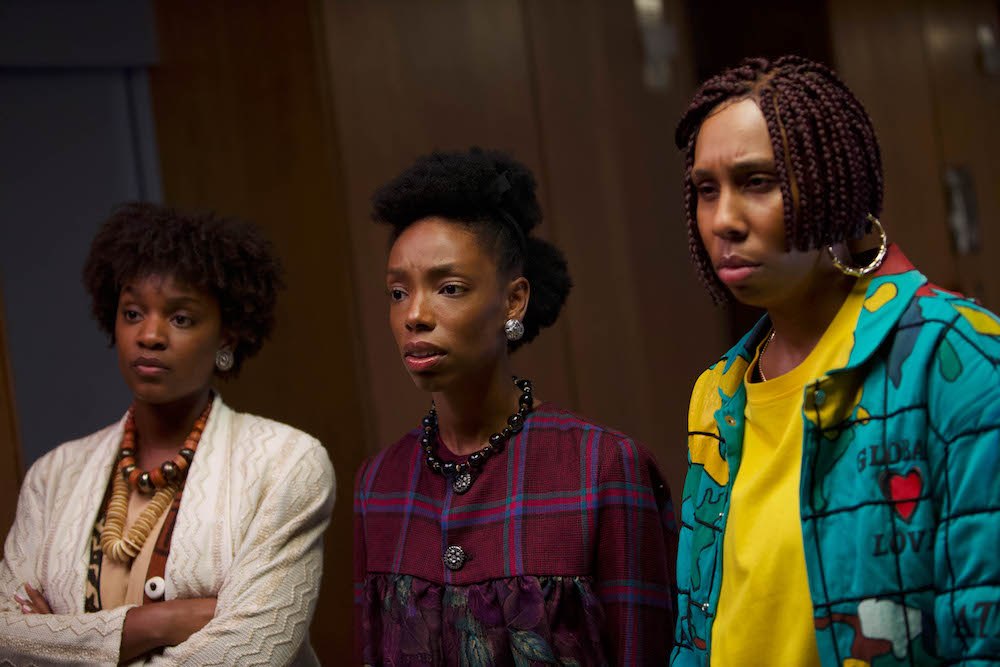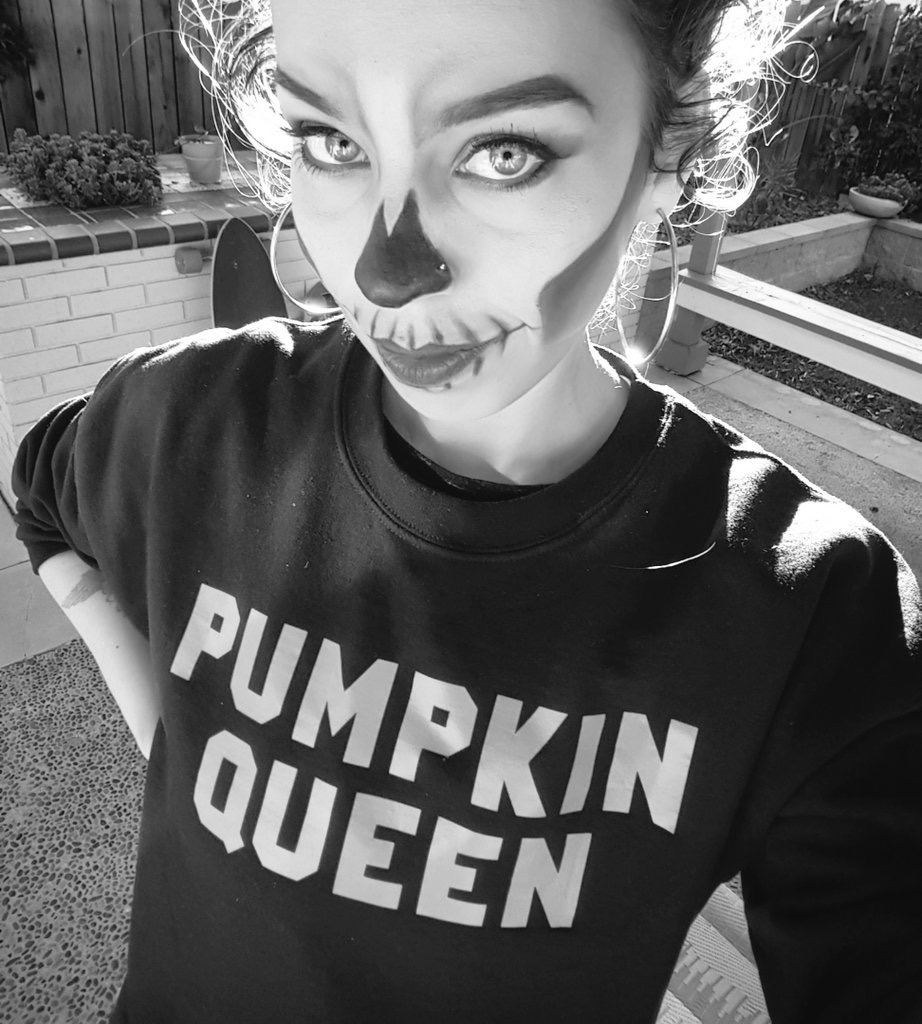What to Watch Verdict
Bad Hair takes a popular J-horror framework and deftly retools it to speak on the Black experience in western society. Sound design and stellar performances make it a must-watch.
Pros
- +
✨Visually engaging.
- +
✨Unique narrative.
- +
✨Lead actors bring their A-game.
Cons
- -
✨Slightly clumsy metaphor.
It is a near-universal truth that a new hairstyle can change your life. A fresh cut, new bundles, even a YouTube tutorial that turns out as promised can instill the hair owner with a newfound confidence that lasts for ages. What if that confidence evolved (or devolved) more of a stark duality? Writer-director Justin Simien explores the concept in his sophomore feature film Bad Hair.
Set in 1989, the story follows Anna Bludso (Elle Lorraine, in her big-screen debut), a young assistant striving to make it in the world of Los Angeles television production, where image is everything. Casting agents throw coded words like “urban” as barbs, dismissing Anna even though she’s clearly qualified for the parts she goes out for. On paper, she looks great—clearly, it’s her unassuming failure to meet the beauty standards of others that disqualifies her for success. She works at a Black-centric network called “Culture,” a through-and-through celebration of Black art and Black culture—which, the film points out, is the foundation of American pop culture itself. Corporate chaos and new leadership has Anna stressing about her future with Culture amid a shifting musical landscape, and she is willing to do anything to get where she feels destined to be—at the top.
Many modern horror movies set their narratives in the 80s for either nostalgia cash-in, avoiding pesky technological plot holes, or both. Simien locates his story in the shifting music industry of 1989 with intent and purpose; it was a time when New Jack Swing and “all that rap shit” (to quote a white exec in the film) was gaining currency within the mainstream pop culture consciousness. With Black art still angling for widespread legitimacy in spaces of white saturation, the time and place are a snug, sound fit in a way that would be too on-the-nose if it were set today. Simien is neither slumming nor phoning it in by wading into horror waters; every choice is filled with purpose.
Anna has felt shame towards her type 4C hair her whole life; an opening scene shows her childhood self getting a chemical burn from an at-home hair relaxing treatment gone wrong. The scalp scar that results from that incident serves as a constant reminder of her mortification towards her characteristic hair texture. Her Uncle Amos (Blair Underwood), a professor of folklore studies, elaborates to her, “From the moment you are born, you are so thoroughly indoctrinated by the insanity of western-European world views that you can’t bear to see yourself the way nature would have.”
The feeling resurfaces when new executive in town Zora (Vanessa Williams) promotes Anna to associate producer and throws in a critique of her look, the implication is clear: fall in line with what’s hot or find a new job. So, Anna gets a weave. The silky, stick-straight coiffure that she gets done at popular Black salon Virgie’s (Virgie herself is played by a radiant Laverne Cox) seems to be the key to mainstream success; it turns out to be more than she bargained for. As the hair takes over, Anna begins to ascend the industry ladder while she descends into identity loss.
A small aside before the reply guys pop in nitpicks: the answer is obvious-- cut it off, right? Shave your head, story’s over. Well, the film provides a brutal counter-point in the form of a human sacrifice to the plot hole gods. Once it’s clear that Anna is stuck with this new ‘do, it’s up to her to separate herself from the new dark persona formed by it.
While Anna’s identity is at stake, she knows who she wants to be. Sandra (Kelly Rowland), one of the top artists whose videos play on Culture, is a Miss Jackson avatar who is climbing the charts with her hits, “I Get It”/ “One Night.” In the video, she shimmies and pops with what the Culture staffers observe as a new nose, contacts, and a new weave. The result is a whitewashed shift in Sandra’s image that no doubt made it easier for her to crossover into the mainstream. But not everyone is on board. “How anyone could sew someone else’s dead energy into their head is beyond me,” Anna’s colleague Sista Soul (Yaani King Mondschein) laments. Simien leans into this angle with a dive into lore.
The latest updates, reviews and unmissable series to watch and more!
Killer hair is a staple of East Asian horror. From Sion Sono’s Exte: Hair Extensions to Shin-yeon Won’s The Wig, horror films have taken a comb to beauty ideals and crafted cautionary tales against toeing the line with them. When they’re not specifically about women’s tresses, J-horror especially utilizes women’s hair as a symbolic trope (looking at you, Hideo Nakata), representing sexuality and power for another common trope: the maligned woman seeking vengeance.
With Bad Hair, Simien takes the template and re-calibrates it to interrogate the white beauty standards imposed upon everyone else as part of a larger conversation about Black women’s relationship with their hair. At first, Anna’s attempts to dive into the Black and Native American folklore on the subject turns up few answers because, as her Uncle puts it, “Conquerors don’t write much about the people they conquer.” But soon enough, a “moss-haired girl” slave legend (in the traditional be-careful-what-you-wish-for fashion) acts as a parallel that all but dooms poor Anna to a Stepford Wives-esque future. The metaphor gets muddled when the body count is comprised mostly of other Black women who maintain their natural hair in protective styles, but it still works as a fable about the identity-consuming repression in white-instilled beauty ideals.
The film serves plenty of technical finesse, from subtle staging to amplify power dynamics between the characters to disciplined camerawork, but it’s the sound design does a lot of heavy lifting in highlighting the importance of hairstyling. From Julius (Jay Pharoah) constantly brushing his stylish new fade to the strained noise of Anna’s natural locks being wrestled into submission for a sew-in weave, the aural assault works overtime to immerse the viewer as much as possible into the Black experience with hair.
Elle Lorraine’s performance is pitch-perfect, which is no surprise for fans of comedy-drama series Insecure. Hunching her shoulders, widening her eyes to dinner-plate size, and shrinking into herself like a frightened turtle, her physicality makes it easy to empathize with—and perhaps pity— her as a small fish in a massive pond. When it’s hinted and later revealed that Anna has a well-hidden but aggressive side to her, Lorraine amps up the intensity in kind with a facial and vocal transformation just subtle enough to walk the hair-thin line between satire and caricatured camp.
Casting Vanessa Williams, the first Black woman to be crowned Miss America, as Zora is a master stroke. A light-skinned Black woman with ever-changing hair and bright eyes, the singer-actress no doubt knows the intimate struggle of Black women in white-dominant industries. When she gently croons to Anna, “Music people have certain expectations, and my girls need to flow freely,” it’s delivered with an edged sweetness that’s surely layered with Williams’ personal journey breaking down barriers along her storied career. She is not the only one; the cast is peppered with R&B/hip hop giants like Rowland, Usher, and MC Lyte, lending weight and visual testimony to the high-concept social critique.
Simien’s satire is a Black horror film playing in the J-horror sandbox, but that’s not to say that it’s a mimic of another culture’s lore; locating its horror specifically within the discrimination and image issues that Black women face in the workplace and beyond, Bad Hair is a unique, vibrant entry in the beauty-is-pain subgenre.
Bad Hair will hit Hulu on October 23rd 2020.
- Hulu & Hulu Live plans, pricing and channels
- How to watch Hulu without commercials
- How many simultaneous screens can Hulu have?
- How to clear your Hulu viewing history
- Does Hulu have Fox regional sports networks?
Anya Stanley is a FANGORIA columnist, published author, film critic, and staunch Halloween 6 apologist. Her work can be found at AV Club, Crooked Marquee, Birth. Movies. Death., and her website and on Twitter.


